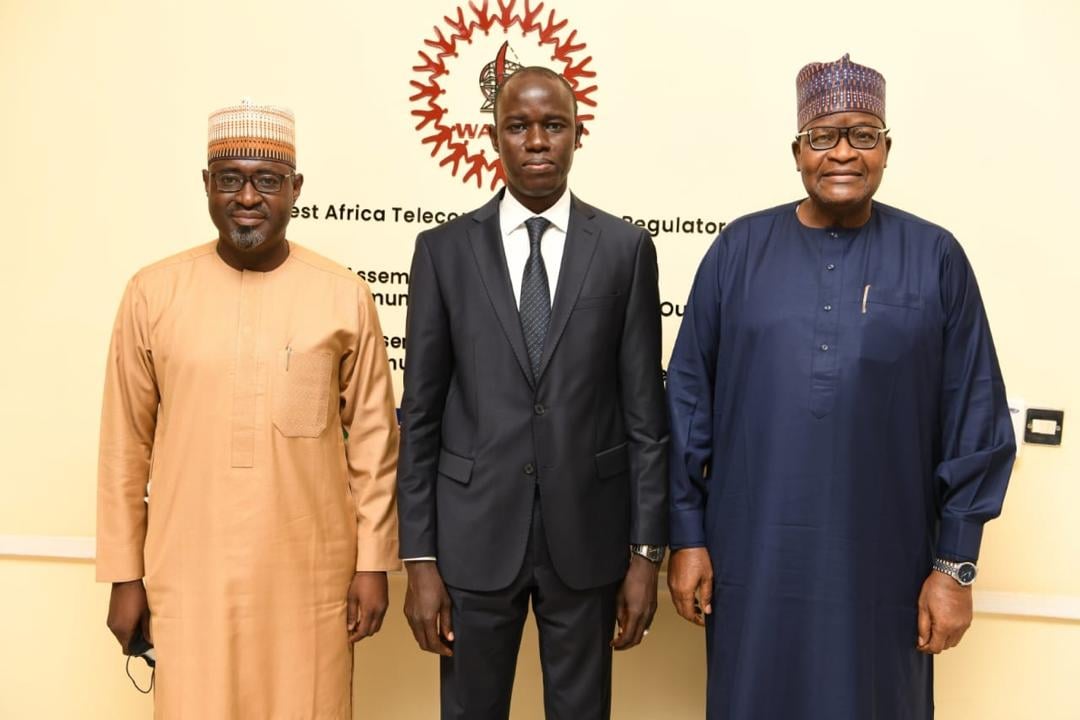Telecom
Danbatta, Ndiaye, Hoist Senegal’s Flag @ WATRA Secretariat

An event of historical significance took place in Maitama, Abuja on 16th September 2021, as the Executive Vice Chairman and Chief Executive Officer (EVC/CEO) of the Nigerian Communications Commission (NCC), Prof. Umar Garba Danbatta, joined His Excellency, Babacar Matar Ndiaye, the Ambassador of the Republic of Senegal to Nigeria, to hoist the flag of Senegal at the Secretariat of West Africa Telecommunications Regulators Assembly (WATRA).

L-R: Aliyu Yusuf Aboki, Executive secretary of WATRA; Babacar Matar Ndiaye, Ambassador of the Republic of Senegal to Nigeria and Prof. Umar Garba Danbatta, Executive vice chairman and chief executive officer (EVC/CEO), Nigerian Communications Commission (NCC), during the hoisting of flag Senegal at the Secretariat of West Africa Telecommunications Regulators Assembly (WATRA).
Danbatta, who is also the Chairman of the Executive Council of WATRA, stated that the event was of such profound significance that it transcends the physical hoisting of the flag, noting that “it symbolises the cohesion taking place in WATRA” and giving concrete and louder expression to collaboration and cooperation among members states of the regional telecom regulatory body.
Prof. Danbatta also said that the increasing demonstration of cooperation and cohesion by WATRA member states signifies unflinching commitment to harnessing ICT resources to improve the quality of life of the people of the sub-region, noting that ICT remains an enabler for bridging the gaps in the pathway to development.
Strengthening Danbatta’s position, Ambassador Ndiaye, who is also Senegal’s Permanent Representative to ECOWAS, described the ceremony as a happy occasion, noting that it was gratifying to gather at WATRA Secretariat to hoist the flag of Senegal alongside those of other member states.
He said Senegal has never relented in making remarkable contributions to ECOWAS and other regional bodies and indicated his country’s readiness to work within the political and economic framework of ECOWAS to streamline challenges facing regulators like WATRA.
Ambassador Ndiaye further stated that among the key challenges regulators face are the emergent Internet of Things, Artificial Intelligence, the convergence of networks and applications, the imperative of infrastructure sharing and the increasing needs of telecom consumers, dynamics of financial services, and electronic commerce in general.
Ndiaye asserted that the telecom regulator is central to the acceleration of growth in other sectors of the economy and therefore occupies a significant place in the socioeconomic space.
He looked forward to continued collaboration to address the myriads of challenges in the telecom sector, and noted that the outbreak of COVID-19 and the envisioned post-COVID-19 relations have compounded the challenges of telecom regulation.
The Senegalese envoy seized the opportunity of the occasion to convey the gratitude of the Government and people of Senegal to the Federal Government of Nigeria for hosting WATRA, and thanked the NCC for the support it has continued to offer WATRA and for promoting greater cooperation among member states towards harnessing the benefits of the Fourth Industrial Revolution.
Aliyu Yusuf Aboki, the Executive Secretary of WATRA, in his welcome address, expressed extreme delight at having the ambassador and the chairman of WATRA at the flag presentation and hoisting ceremony.
Aboki noted that the presence of the duo underscored the importance that “policymakers and political authorities in Africa attach to the digital economy as a means of promoting investment, jobs and growth”, even as the meeting also signifies the sub-regional determination to work together in order to improve telecommunications regulations in a manner that enables “operators and investors to deliver more affordable, higher quality and more innovative services” to the people of West Africa.
Aboki who also recalled the rare strides made by the Government of Senegal in promoting digital economy amplified the voice of Ndiaye by expressing the gratitude of the 16 member countries of WATRA to the Nigerian Government, which, through the NCC, has continued to support “the Assembly and for hosting WATRA.”
The West African Regulators Assembly (WATRA) is made up of ECOWAS member states and Mauritania. The hoisting of the flag of member states of WATRA at the Secretariat, an initiative of the Danbatta-led Executive Council, commenced after the last AGM where Aboki and Danbatta emerged, respectively, as Executive Secretary and Chairman of the Executive Council.
Thirteen member states had their respective flags hoisted at the AGM while Mauritania later sent a representative to perform the flag hoisting ceremony. With Senegal’s symbolic presentation of its flag and its hoisting today, WATRA looks forward very excitedly to The Republic of Ghana to present and hoist its flag soon, in order to complete that process to further consummate the bonding among members of the Assembly.
Telecom
MTN Nigeria Crowns Ayo Benzi Winner of Next Afrobeats Star

MTN Nigeria, in collaboration with ONErpm and Ultima Studios, has announced Ayodeji Benson, popularly known as Ayo Benzi, as the winner of the maiden edition of the Next Afrobeats Star reality show.

L-R: Onyinye Ikenna-Emeka, Chief Marketing Officer, MTN Nigeria; Ayodeji Benson, Winner, Next Afrobeats Star Reality Show (Season 1) and Emamoke Ogoro, General Manager, Brand and Communication, MTN Nigeria, at the grand finale of the Next Afrobeats Star Reality Show (Season 1), held at the Ultima Studios, Lekki, Lagos on Saturday, December 13, 2025.
The grand finale, held on Sunday night at Ultima Studios in Lekki, Lagos, marked the climax of a nationwide talent search that began in September with over 15,000 aspiring musicians.
After weeks of auditions, mentorship, and rigorous training, five finalists – Ayo Benzi, Dave Cash, Kaeko, Somto O’Laker, and Lucky Yay – battled for the top prize in a high-energy showcase of performance and artistry.
At the end of the electrifying contest, Ayo Benzi emerged victorious, securing a ₦150 million music deal. Dave Cash was named first runner-up with ₦100 million, while Kaeko, Somto O’Laker, and Lucky Yay received ₦75 million, ₦50 million, and ₦25 million respectively.
Throughout the season, contestants were mentored by leading Afrobeats producers Sarz, Puffy Tee, P Prime, and Andre Vibez. Benzi, who was part of Puffy Tee’s team, credited the mentorship programme for sharpening his craft and stage presence.
Speaking at the event, Onyinye Ikenna-Emeka, Chief Marketing Officer of MTN Nigeria, said the initiative reflects the company’s commitment to youth empowerment and cultural expression.
“The Next Afrobeats Star platform is about creating real opportunities for young Nigerians and giving their talent the structure, visibility, and support it deserves.
“Afrobeats continues to place Nigeria on the global cultural map, and MTN is proud to be enabling the next generation of artists who will take this sound even further,” she said.
She added that the finale was not just a competition but a celebration of growth and readiness for the global stage.
In his acceptance speech, Ayo Benzi described the victory as a defining moment in his career.
“A big thank you to MTN. From the audition days, the treatment MTN has given us has been amazing. God bless the brand,” he said.
The finale also featured guest performances by Afrobeats stars Iyanya and Bella Shmurda, adding glamour to the night and reinforcing the show’s connection to the wider music ecosystem.
With the successful conclusion of the season, MTN Nigeria and its partners reaffirmed their role in championing youth ambition, supporting creative industries, and shaping the future of Nigerian music through platforms that turn potential into opportunity.
Telecom
T2 Faces NCC Probe in Benue Over Major Service Outage in 9 LGAs

T2, formerly known as 9mobile, is under investigation by the Nigerian Communications Commission (NCC) in Benue State for an undisclosed incident disrupting USSD, SMS, voice, and data services across nine local government areas.

T2
The affected areas include Ado, Agatu, Gwer East, Gwer West, Konshisha, Obi, Ohimini, Okpokwu, and Otukpo, as detailed in an advisory on the NCC Major Outages Portal, which tracks significant disruptions reported by Mobile Network Operators (MNOs) and Internet Service Providers (ISPs).
Neither T2 nor its public relations firm, Chain Reactions, has responded to inquiries on the outage’s cause or restoration efforts as of this report.
The NCC’s continued reference to the operator as 9mobile, months after its public rebranding to T2 in August 2025, has sparked questions about whether the name change was formally notified to the regulator.
This probe aligns with NCC mandates requiring operators to disclose major outages, their impacts, and timelines for fixes, with compensation obligatory for disruptions exceeding 24 hours under the Consumer Code of Practice Regulations.
Industry watchers note that such incidents, often linked to fibre cuts, power failures, or infrastructure faults, underscore ongoing challenges in Nigeria’s telecoms sector, particularly amid T2’s subscriber losses post-rebrand. NCC vows transparency via its portal to hold operators accountable and protect consumers.
Telecom
NCC Unveils Draft 5-Year Spectrum Roadmap, 60 GHz License-Exempt Guidelines to Boost Broadband, Innovation

Nigerian Communications Commission (NCC) has unveiled two pivotal regulatory draft documents aimed at reshaping Nigeria’s communications sector over the next five years and fast-tracking deployment of ultra-high-speed wireless technologies.

NCC
In a public notice dated December 19, 2025, and issued pursuant to its mandate under the Nigerian Communications Act (NCA) 2003, the Commission published the Draft 5-Year Spectrum Roadmap for the Communications Sector (2025–2030) and Draft Guidelines for the Use of the 60 GHz License-Exempt Band for Multi-Gigabit Wireless Systems.
Both documents are accessible on the NCC website for stakeholder review, with the roadmap outlining strategic spectrum planning, allocation, and management to optimise utilisation, support emerging technologies like 5G and IoT, expand broadband access, and align with global best practices.
The Spectrum Roadmap emphasises four core pillars: bridging the digital divide through low-band spectrum and satellite services, attracting investments via flexible licensing models, enhancing service quality with mid-band optimisation, and fostering innovation in areas such as direct-to-device connectivity and secondary spectrum trading.
It sets ambitious targets including universal 4G coverage nationwide, 50 per cent 5G penetration in state capitals, and average broadband speeds of 100 Mbps by 2030, while addressing rising data demand through band refarming and efficient management.
Complementing this, the 60 GHz Guidelines establish a license-exempt framework for the 57–66 GHz band, enabling multi-gigabit speeds up to 10 Gbps for short-range applications like WiGig, fixed wireless access, enterprise connectivity, urban broadband, and backhaul solutions.
The rules mandate NCC type approval for equipment, site registration for outdoor use, and interference mitigation measures, while prohibiting wide-area networks to safeguard primary users.
In line with Section 58 of the NCA 2003, NCC invites comments from industry operators, equipment manufacturers, consumer groups, and the public, with submissions due by Friday, January 16, 2025, via email to [email protected], [email protected], and [email protected].
The notice, signed by Mrs Nnenna Ukoha, Head of Public Affairs, stresses that stakeholder inputs will refine the frameworks to drive innovation, investment, competition, and sustainable growth in Nigeria’s telecoms ecosystem.

 E-Financial2 days ago
E-Financial2 days agoNigeria’s N58.18trn Budget and Rising Cost of Deficit Governance

 Telecom2 days ago
Telecom2 days agoNnaemeka Ani – The Architect of ‘Code and Courage’

 Telecom2 days ago
Telecom2 days agoMTN Nigeria Appreciates Partners, Customers at Lagos Prestige Experience

 Telecom1 day ago
Telecom1 day agoT2 Faces NCC Probe in Benue Over Major Service Outage in 9 LGAs

 Telecom1 day ago
Telecom1 day agoNCC Grants 45 Days for Telecoms Firms to Fix Unapproved Shareholding Changes

 Telecom1 day ago
Telecom1 day agoNCC Unveils Draft 5-Year Spectrum Roadmap, 60 GHz License-Exempt Guidelines to Boost Broadband, Innovation

 Telecom1 day ago
Telecom1 day agoMTN Nigeria Crowns Ayo Benzi Winner of Next Afrobeats Star

 E-Business23 hours ago
E-Business23 hours agoJumia CEO says Black Friday Signals Nigeria’s E-Commerce Maturity



























